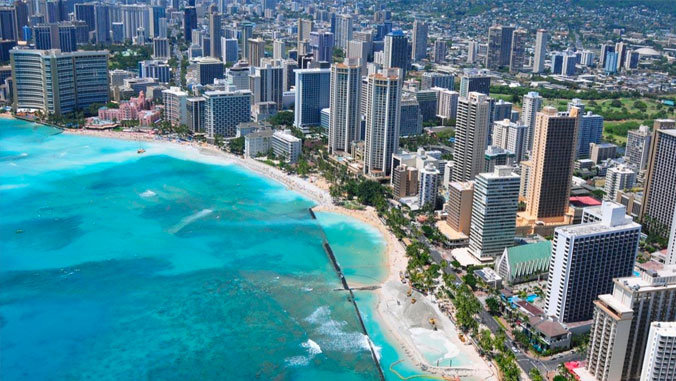
Recent developments bring both promise and peril for Hawaiʻi, according to the University of Hawaiʻi Economic Research Organization’s (UHERO) second quarter forecast for 2023. Tourism prospects are positive, despite the delayed Japanese market recovery. Construction activity will remain high, and inflation is receding rapidly, setting the stage for real income gains. On the flip side, the Fed’s aggressive rate hikes and liquidity problems sparked by recent bank failures threaten the U.S. and global economies. A national recession will weigh on Hawaiʻi later this year, but local sources of strength should keep our heads above water.
Highlights of the May 12 report:
- The external environment facing Hawaiʻi is dicey. The Federal Reserve appears likely to maintain its high interest rate policy for some time, and tighter lending conditions associated with recent bank failures will also weigh on U.S. growth. A recession beginning late this year will hold U.S. GDP growth to 1.5% this year and 0.3% in 2024.
- Tighter credit conditions will also contribute to a weaker global economy. Canada will fare only a bit better than the U.S. In Japan, lagging exports and high inflation will offset government support. Australia’s economy will expand only modestly, as inflation and higher interest rates limit consumer spending. While China’s economic recovery is underway, there is no indication of a pending upturn in their travel to the U.S.
- Despite weakening external conditions, the visitor industry has continued to perform well, with activity only slightly below 2019 levels. The U.S. market still dominates, but it will soften as the year progresses. Further international market recovery will sustain visitor numbers. Lagging Japanese travel will continue to be a problem.
- Solid visitor demand continues to benefit hotels, causing room rates to soar on the neighbor islands. Statewide, real revenue per available room is now 6% higher than in 2019. Visitor spending has been strong despite the incomplete recovery of international markets. Both the number of visitor days and real visitor spending will fall slightly next year, before returning to moderate growth. Over the long run, climate change may become a substantial tourism challenge.
- The Hawaiʻi labor market is healthy, with about 3.5% unemployment. Labor force recovery and softening labor demand have largely eliminated the overall worker shortage, although businesses still report hiring challenges. Labor force recovery differs by county, mostly because of differences in inward and outward migration. Net out-migration at the statewide level may be due in part to heightened cost of living concerns in the face of challenging pandemic-era economic conditions.
- Weakening U.S. tourism, tight credit and high interest rates will weigh on the Hawaiʻi economy this year and next. The unemployment rate will rise above 4% by the beginning of next year, and moderate job gains will not resume until 2025.
- Hawaiʻi inflation has receded more quickly than in the U.S. overall. This will support income gains. Real income nearly recovered to the pre-pandemic level last year and will grow at a 2.5% average annual pace over the next three years.
- Because of surging home prices and mortgage interest rates, affording a single-family home now takes twice the income it did a decade ago. The culprit is a lack of new supply, due in part to regulatory hurdles. Major public sector projects will support a high level of construction activity. The construction job count will top 41,000 by 2026.
Despite heightened downside risks, Hawaiʻi is still likely to avoid an outright recession. Like the U.S. overall, how much our economy weakens will depend importantly on the Federal Reserve, in particular whether the Fed eases policy now that inflation is declining and the U.S. economy is beginning to slow. Higher rates for longer would impose a significant burden.
UHERO is housed in UH Mānoa’s College of Social Sciences.

